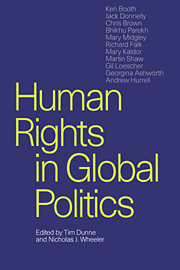Book contents
- Frontmatter
- Contents
- List of contributors
- Preface and acknowledgements
- Introduction: human rights and the fifty years' crisis
- I Theories of human rights
- II The practices of human wrongs
- 6 The challenge of genocide and genocidal politics in an era of globalisation
- 7 Transnational civil society
- 8 Global voices: civil society and the media in global crises
- 9 Refugees: a global human rights and security crisis
- 10 The silencing of women
- 11 Power, principles and prudence: protecting human rights in a deeply divided world
- 12 Learning beyond frontiers
- Index
6 - The challenge of genocide and genocidal politics in an era of globalisation
Published online by Cambridge University Press: 05 June 2012
- Frontmatter
- Contents
- List of contributors
- Preface and acknowledgements
- Introduction: human rights and the fifty years' crisis
- I Theories of human rights
- II The practices of human wrongs
- 6 The challenge of genocide and genocidal politics in an era of globalisation
- 7 Transnational civil society
- 8 Global voices: civil society and the media in global crises
- 9 Refugees: a global human rights and security crisis
- 10 The silencing of women
- 11 Power, principles and prudence: protecting human rights in a deeply divided world
- 12 Learning beyond frontiers
- Index
Summary
Human wrongs as a world order challenge
Every phase in the history of international relations and world order can be identified by its distinctive achievements and failures. Almost as truly as Tolstoy observed with reference to families, each historical moment resembles all others with respect to its moral achievements, while defining its specific identity in relation to the particular form of its failures. Yet as Ken Booth observes in the essay that inspires this volume, there has been a systemic refusal on the part of academic specialists and diplomats to acknowledge moral failure with respect to the organisation of international political life, that domain of political behaviour called international relations or world order.
World order has been analysed for centuries, with notable exceptions, as if human suffering was irrelevant, and that the only fate that mattered was either the destiny of a particular nation or state or the more general rise and fall of great powers, the latter being regarded as a virtually determined consequence of recurrent rivalry that is embedded in a world of self-regarding states competing for territory, wealth, influence and status. Even such an egoistic moral aperture is generally misleadingly large, as it is rare indeed that the whole of a given people share in power and authority sufficiently to be regarded as effectively included in the self. The struggle in constitutional democracies to extend tolerance and suffrage to minorities and women reminds us that even in societies committed in principle to equality of rights, the representation of the self by the state is partial, at best, and by no means complete.
- Type
- Chapter
- Information
- Human Rights in Global Politics , pp. 177 - 194Publisher: Cambridge University PressPrint publication year: 1999
- 5
- Cited by



